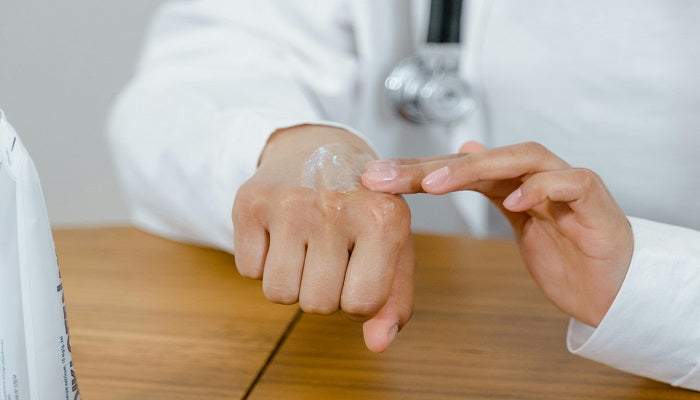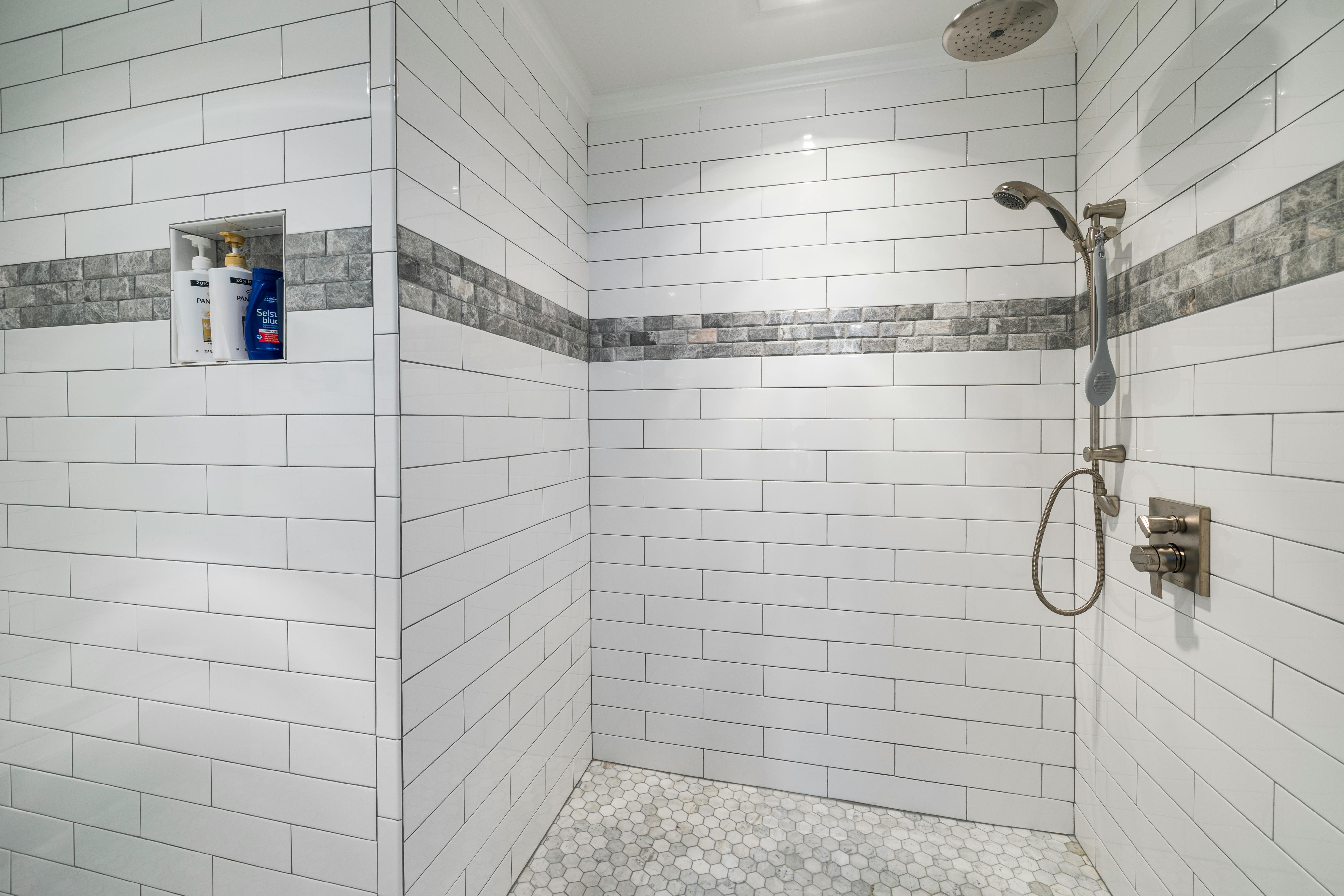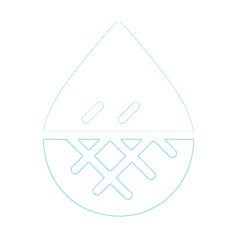Eczema and Hard Water: What You Need to Know
Eczema (Atopic Dermatitis, AD) is more than just “dry, itchy skin.” It’s a chronic skin condition that can affect anyone—from children to adults—causing relentless itching, redness, and inflammation that often disrupt daily life and even sleep. The triggers are everywhere: food, pollen, dust mites, seasonal changes, stress, and even air pollution. And the worst part? The more you scratch, the worse it gets—scratching not only intensifies the itch but also damages the skin, making treatment less effective.
Although eczema has been recognized for nearly a century—the term atopic dermatitis was first formally described in 1933—it’s still a condition full of hidden complexities. “Atopic” refers to a tendency for the immune system to overreact to allergens, while “dermatitis” means skin inflammation. Together, they describe the stubborn, recurring cycle of eczema: irritated skin driven by an overactive immune system.
Most people know genetics and immunity play a role, but what often gets overlooked is something much closer to home: the water we use every day. Recent research shows that hard water—rich in minerals like calcium and magnesium—can weaken the skin barrier, worsen dryness, and even increase the likelihood of developing eczema.
In this article, we’ll break down the science behind how eczema develops, reveal surprising environmental triggers (including water quality), and share practical, science-backed steps you can take to better manage eczema and improve skin health—starting right from your shower.

The Mechanisms Behind Eczema
Eczema is essentially an “overreaction” of the skin. The skin is naturally our body's protective barrier, but in eczema patients, this barrier becomes fragile, prone to leakage, and susceptible to external irritants and allergens, leading to inflammation.
We can break down the development of eczema into the following aspects:
Immune System Imbalance: Why Eczema Triggers Inflammation Easily
In eczema patients (especially those with atopic dermatitis), the immune system acts like an “overly sensitive” defense force. External stimuli that should only require a mild response (such as dust or pollen) are mistakenly identified as “enemy invasions.” As a result, immune cells become abnormally active, releasing large amounts of inflammatory signals, leading to skin redness, itching, and even fluid leakage. This is why eczema often recurs; once medication is discontinued or exposure to triggers occurs, it easily flares up again.
Skin Barrier Damage: Filaggrin Deficiency and Dry, Sensitive Skin
Healthy skin acts like a “wall,” effectively retaining moisture and blocking allergens and irritants from entering. However, the skin barrier in eczema patients is inherently fragile: defects in key proteins (such as filaggrin) make the skin prone to dehydration, dryness, and cracking. As a result, dust, bacteria, and chemicals in cleaning agents can easily “exploit vulnerabilities,” further exacerbating inflammation.
Genetics and Environment: From Allergens to Hard Water Exposure
Eczema often has a genetic component. For example, if parents have a history of allergies or skin conditions, their children are more likely to develop eczema. However, genetics are not “fate”; environmental factors play a key triggering role:
Allergens、climate changes、water quality issues, these factors, when combined, act like “fuses,” triggering the onset of eczema.
The difference between acute and chronic eczema
- Acute eczema: Skin exudation and blistering, which is a “flushing” mechanism that helps remove irritants.
-
Chronic eczema: Skin thickening and hardening, which is a “defense mechanism” that prevents external irritants from re-entering.
However, the problem is that this defense is “excessive,” causing the skin barrier to deteriorate and making it more prone to recurrence, forming a vicious cycle.

Common Triggers and Aggravating Factors of Eczema
Eczema flare-ups are typically not caused by a single factor but are influenced by a combination of internal and external factors. The following are considered common triggers and aggravating factors:
Stress and Eczema: The Impact of Anxiety and Poor Sleep
Chronic tension, anxiety, or sleep deprivation can stimulate the secretion of stress hormones (such as cortisol) in the body. While these hormones can help the body cope with stress in the short term, prolonged elevated levels can disrupt the balance of the immune system, making inflammatory responses more likely to be triggered and exacerbating eczema symptoms.
Clinical studies have shown that patients with atopic eczema are more likely to experience depression and anxiety, and there is a risk of mental health issues regardless of the severity of the eczema. Stress can also impair the skin's repair function, making it harder for damaged barriers to recover.
Therefore, psychological factors are considered an important influencing factor in atopic dermatitis. This means that psychological management (such as relaxation training, exercise, and meditation) is equally important in eczema treatment.
Lifestyle and Environmental Factors: Diet, Climate, and Harsh Chemicals
- Food allergies: Some eczema patients are sensitive to certain foods (such as milk, nuts, and seafood), which can trigger skin inflammatory reactions when consumed.
- Climate conditions: Dry, cold environments can cause the skin to lose moisture, while humid, hot climates may increase the risk of bacterial and fungal infections.
- Cleaning products and chemical irritants: Strong alkaline soaps, detergents, and fragranced skincare products can further damage the skin barrier, exacerbating eczema.
These everyday factors may seem minor, but their long-term accumulation can make eczema more difficult to control.
Water Quality: How Hard Water Can Worsen Eczema
In recent years, the relationship between water quality and eczema has gradually attracted the attention of researchers. Hard water refers to tap water containing high concentrations of calcium and magnesium ions, as well as residual chlorine.
The minerals in hard water can deposit on the skin's surface, raising the pH level of the skin's outer layer (making it more alkaline), weakening the skin's natural acidic protective barrier, and damaging the skin barrier. The result is drier, more easily cracked skin, with irritants and allergens more easily penetrating.
Overall, hard water not only makes the skin feel dry and tight but may also be an “invisible contributor” to the long-term recurrence of eczema. Improving water quality (such as using filtration or softening equipment) is considered an important step in reducing environmental triggers.

What Is the Connection Between Hard Water and Eczema? Here’s What Science Says
Hard water refers to water containing a high concentration of calcium (Ca²⁺) and magnesium (Mg²⁺) ions. When these minerals dissolve in tap water, they cause the water to become “hard.” In addition to causing everyday inconveniences such as limescale buildup and difficulty in producing soap lather, an increasing number of studies suggest that hard water may be closely associated with the onset and exacerbation of eczema (atopic dermatitis).
Epidemiological Evidence: Higher Eczema Risk in Hard Water Areas
Many studies have shown that people living in hard water areas tend to have higher rates of eczema (National Eczema Association, 2024). This has led researchers to look more closely at the role of water quality in eczema flare-ups.
One well-known study, the SWET trial in the UK (2011), tested whether water softeners could help manage moderate to severe eczema. The results showed no major improvement in clinical scores, but interestingly, more than half of the families still chose to install water softeners after the trial. Among them, 66% of parents reported that their children’s symptoms improved. This suggests that while water softeners may not be a “cure,” improving water quality can make a noticeable difference in quality of life.

Researchers have also started to explore the preventive side. The SOFTER trial (2019) is investigating whether exposing newborns to softened water early in life could reduce the chances of developing atopic dermatitis. This reflects a growing recognition that water quality may be an important early intervention point.
And it’s not just about children—adults are affected too. A large UK Biobank cohort study (Lopez et al., 2022) analyzed data from adults aged 40–69 and found that those living in hard water regions had a significantly higher risk of eczema. What’s more, this link held true across different income and social groups, showing that hard water itself is an independent risk factor, not just a side effect of lifestyle or other environmental conditions.
Regarding the mechanisms by which hard water affects eczema, scientists have proposed several possible explanations:
Altering skin pH
Hard water makes the skin surface more alkaline, weakening the activity of enzymes that maintain barrier function, thereby impairing moisture retention and defensive capabilities.Reaction with detergents: Calcium and magnesium ions in hard water easily bind with soap, forming irritating residues on the skin surface that exacerbate inflammation.
Direct damage to the skin barrier
Prolonged exposure to hard water accelerates the loss of natural moisturizing factors, constituting a “secondary blow” to the already fragile skin of eczema patients.
Based on existing evidence, it is clear that hard water is significantly associated with an increased risk of eczema, regardless of age. While the efficacy of interventions such as water softeners remains controversial in clinical scoring, numerous household and patient experiences support the view that improving water quality benefits eczema management.
Hard water is not merely a minor inconvenience in daily life but may be an important environmental trigger for the chronic recurrence of eczema. Improving household water quality may be an important aspect of eczema management that should not be overlooked.
What Are the Best Options for Eczema Relief and Treatment
Medical Treatments: Creams, Oral Medications, and Biologics
- Topical ointments: Corticosteroids and calcineurin inhibitors (such as tacrolimus) are first-line medications for controlling inflammation and itching.
- Oral medications and biologics: For moderate to severe eczema, doctors may prescribe antihistamines, immunosuppressants, or newer biologic therapies (such as dupilumab) to help suppress excessive immune responses.
Note: These treatments should always be used under medical supervision and tailored to each patient’s specific condition.

Daily Management: Moisturizing, Gentle Cleansing, and Stress Reduction
Skin hydration
Apply emollients within 3 minutes after bathing to lock in moisture and prevent further barrier damage.
Gentle cleansing
Avoid cleansers with alcohol, fragrance, or harsh surfactants.
Behavioral interventions
Techniques like distraction can improve quality of life.
Trigger avoidance
Minimize exposure to dust mites, pollen, certain food allergens, and overly hot bathwater.
Psychological interventions
Research shows that stress can worsen inflammation via the endocrine system. Practices such as meditation, yoga, and mindfulness relaxation can help reduce itching and scratching urges.
The Role of Water Quality in Eczema Relief and Sensitive Skin Care
Water quality plays a major role in skin health, especially for people prone to eczema. Hard water, rich in calcium and magnesium, can weaken the skin’s natural barrier and worsen dryness or irritation. Chlorine in tap water can also trigger flare-ups. That’s why switching to softened or filtered water is considered one of the simplest yet most impactful steps for creating a skin-friendly environment.
- Filtered or softened water: Helps reduce mineral buildup and chlorine irritation, lowering the risk of skin sensitivity.
- Filtered shower heads: Provide a convenient, cost-effective way to directly reduce irritation during daily bathing.
Product recommend: AquaNurture Filtered Shower Head
For anyone struggling with eczema or sensitive skin, improving your shower water can make a big difference. The AquaNurture Filtered Shower Head is designed to be both practical and effective—an easy upgrade for everyday care.
- Dual-layer filtration: Removes chlorine, calcium, magnesium, and impurities, reducing secondary irritation to skin and scalp.
- Enhanced shower experience: Leaves skin soft and hydrated, hair smoother and less brittle.
- Supports skin repair: Creates a low-irritation bathing environment, allowing moisturizers and medical treatments to work more effectively.
- Safe for all ages: Suitable for children, infants, and individuals with fragile skin—an ideal complement to eczema care.
Managing eczema requires a holistic approach:
- Medical treatments to control inflammation
- Daily care to maintain hydration and reduce triggers
- Environmental improvements, such as better water quality, to reduce long-term irritation
Choosing a filtered shower head like AquaNurture not only enhances daily comfort but also provides a healthier environment for skin repair—an important step toward long-term eczema management and improved quality of life.
Eczema and Hard Water: Key Takeaways for Healthier Skin
Eczema is the result of multiple factors, including immunity, genetics, and the environment. Recent studies have emphasized the potential impact of hard water on eczema: not only children, but also adults may be at increased risk of eczema due to long-term exposure to hard water.
In addition to conventional treatment, improving the daily living environment is equally important. Installing a filtered shower head as a first step to reduce hard water irritation can not only alleviate the burden on the skin, but also help patients enjoy a more comfortable living experience.

Frequently Asked Questions (FAQ) about Eczema, Hard Water, and Filtered Shower Heads
Q1. Can hard water really make eczema worse?
Yes. Hard water contains high levels of calcium, magnesium, and often chlorine. These minerals can disrupt the skin’s natural protective barrier, making it more alkaline and less able to retain moisture. For people with eczema, this means more dryness, irritation, and flare-ups.
Q2. Is soft water better for eczema?
Generally, yes. Soft water is gentler on the skin and helps reduce dryness and irritation. Studies show that people living in hard water areas often report higher rates of eczema compared to those in soft water areas. While soft water isn’t a cure, it can reduce one of the key environmental triggers.
Q3. Do filtered shower heads help with eczema?
Filtration shower heads are designed to remove chlorine, heavy metals, and excess minerals from tap water. By reducing these irritants, they can create a gentler showering experience, leaving skin less dry and itchy. Many people with sensitive skin, including eczema patients, find noticeable relief after switching.
Q4. Are filtered shower heads safe for children and babies with eczema?
Yes. A high-quality filtered shower head is safe for all ages, including infants and children. Babies have especially delicate skin, so reducing exposure to harsh minerals and chlorine can help prevent irritation and support better skin hydration.
Q5. Will a filtered shower head cure eczema?
No. Eczema is a chronic skin condition linked to genetics, immune response, and environmental factors. However, reducing irritants like chlorine and hard minerals can help lower flare-ups, improve comfort, and support the effectiveness of medical treatments and moisturizers.
Reference
- National Eczema Association. The Origin of Eczema and the Centuries‐Old History Behind It. Available from: https://nationaleczema.org/blog/the‐origin‐of‐eczema‐and‐the‐centuries‐old‐history‐behind‐it/
- Singleton H, Hodder A, Almilaji O, Ersser SJ, Heaslip V, O'Meara S, Boyers D, Roberts A, Scott H, Van Onselen J, Doney L, Boyle RJ, Thompson AR. Educational and psychological interventions for managing atopic dermatitis (eczema). Cochrane Database Syst Rev.2024Aug12;8(8):CD014932.doi:10.1002/14651858.CD014932.pub2. PMID: 39132734; PMCID: PMC11318083.
- Lopez DJ, Singh A, Waidyatillake NT, Su JC, Bui DS, Dharmage SC, Lodge CJ, Lowe AJ. The association between domestic hard water and eczema in adults from the UK Biobank cohort study. Br J Dermatol. 2022 Nov;187(5):704-712. doi: 10.1111/bjd.21771. Epub 2022 Aug 18. PMID: 35822417; PMCID: PMC9804584.
- Thomas KS, Dean T, O'Leary C, Sach TH, Koller K, Frost A, Williams HC; SWET Trial Team. A randomised controlled trial of ion-exchange water softeners for the treatment of eczema in children. PLoS Med. 2011 Feb 15;8(2):e1000395. doi: 10.1371/journal.pmed.1000395. PMID: 21358807; PMCID: PMC3039684.
- Jabbar-Lopez ZK, Gurung N, Greenblatt D, Briley A, Chalmers JR, Thomas KS, Frost T, Kezic S, Common JEA, Kong HH, Segre JA, Danby S, Cork MJ, Peacock JL, Flohr C. Protocol for an outcome assessor-blinded pilot randomised controlled trial of an ion-exchange water softener for the prevention of atopic eczema in neonates, with an embedded mechanistic study: the Softened Water for Eczema Prevention (SOFTER) trial. BMJ Open. 2019 Aug 20;9(8):e027168. doi: 10.1136/bmjopen-2018-027168. PMID: 31434765; PMCID: PMC6707708.








Leave a comment
This site is protected by hCaptcha and the hCaptcha Privacy Policy and Terms of Service apply.